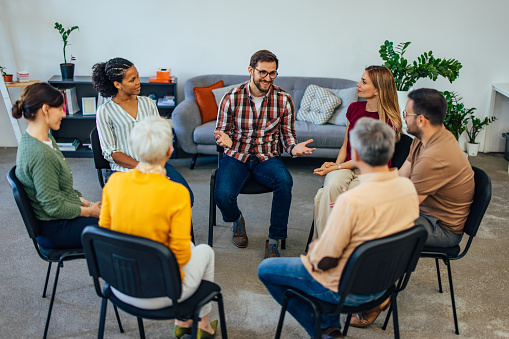Your struggles in life are part of habits learned, inherited, and contributed by those around you. Alternative group therapy allows you to discover valuable insights into your perception through talking and listening to others. It helps you put your problems into perspective, aiding in healing.
Group therapy is designed to help you heal from specific issues such as depression, grief, and anxiety. Here is a deeper analysis of this form of therapy.
Table of Contents
Definition of Alternative Group Therapy
Alternative group healing is a psychological treatment option, based on the premise that people recover best when in a supportive community with others who are working toward healing. Group healing is a compassionate, collaborative, supportive, and long-lasting approach to wellness. It provides new insights into your old perceptions, allowing you to move forward with your passions and goals.
How Alternative Group Healing Works
Group healing, such as family constellation therapy, works through group members helping you resolve an issue. In a normal constellation, there is a facilitator, a seeker, and other participants. You can also use Shapellx products to keep your clothing suitable for group healing.
A seeker is the person who needs to solve an issue such as drug addiction, depression, or anxiety. A facilitator represents the therapist that plans the constellation and guides everyone in the therapy. Lastly, group members are unrelated people who are seekers in their respective sessions.
Analysis of the Seeker’s Issue
Therapy sessions begin with explaining your specific issue, for instance, smoking, relationship struggles, or depression. You inform the facilitator of your issue without discussing the causes.
Reimagining the Family Constellation in a Group
The facilitator selects different people from the group to represent the issue being analyzed. They can request you (the seeker) to choose different people as representatives of family members in a role play.
Representatives are arranged meaningfully, similar to your family situation. Every person in the group remains still during the role play, allowing you to determine if the arrangement makes sense to you.
Making Adjustments
Adjustments are made until you confirm the role play represents your family. Everyone in the group then observes the dynamics among representatives as they interact with each other.
The insights from this exercise can be illuminating and astounding. They are designed to provide a deeper understanding of the issues you are struggling with.
You feel liberated from your frustrations when you observe your struggle in a meaningful context of social patterns. The group setting helps you view your problems differently and realize they are possible to overcome.
Group therapy also helps you identify patterns in your family. You may notice certain disorders among your relatives or realize traumatic events occur at a certain age. This could give you clues regarding the energy in your family and what you need to do to break the cycle.
Resolving Emotional Distress
Alternative group therapy does not end during the group exercise. Learning the source of your problem requires looking further into your social life and finding ways to solve it.
If you need to resolve some issues with a family member, you need to connect with the person to heal emotionally. In a situation where the person is deceased, identify other ways to learn what happened and resolve any lingering family issues.
Try Group Healing Today
Unlike individualized treatment options, alternative group therapy allows you to heal through other people. You get to experience the source of your emotional issues through listening to others and viewing things from the outside. It is a compassionate, long-lasting, collaborative, and supportive healing technique for depression, substance abuse, and relationship issues. As you observe dynamics and insights together, each group member can make progress in their own personal journey of healing and development.




